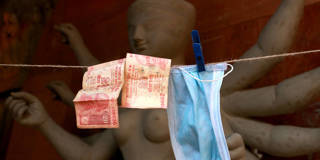If households decide to save more and consume less during an economic slump, then the correct policy response is to increase government spending. Unfortunately, Indian Prime Minister Narendra Modi’s government is doing the opposite during the current pandemic-induced downturn – with potentially disastrous consequences.
NEW DELHI – Students in introductory macroeconomics courses typically used to learn about the paradox of thrift. This theory, popularized by John Maynard Keynes, states that if households decide to save more and consume less during a slowdown or recession (because of uncertainty about future income), then the resulting reduction in aggregate demand will aggravate the economic decline.
Given this counterproductive behavior by both households and private firms, the correct policy response in a slump is to increase government spending. Unfortunately, Indian Prime Minister Narendra Modi’s government is doing the opposite during the current pandemic-induced downturn – with potentially disastrous consequences.
Modi’s fiscal rigidity is symptomatic of a broader long-term trend. In the mid-twentieth century, the Keynesian idea of boosting public spending to counteract a slump was mainstream and widely implemented. But, beginning in the 1980s, fiscal hawks started taking over both the economics discipline and most countries’ commanding heights of economic policymaking.

NEW DELHI – Students in introductory macroeconomics courses typically used to learn about the paradox of thrift. This theory, popularized by John Maynard Keynes, states that if households decide to save more and consume less during a slowdown or recession (because of uncertainty about future income), then the resulting reduction in aggregate demand will aggravate the economic decline.
Given this counterproductive behavior by both households and private firms, the correct policy response in a slump is to increase government spending. Unfortunately, Indian Prime Minister Narendra Modi’s government is doing the opposite during the current pandemic-induced downturn – with potentially disastrous consequences.
Modi’s fiscal rigidity is symptomatic of a broader long-term trend. In the mid-twentieth century, the Keynesian idea of boosting public spending to counteract a slump was mainstream and widely implemented. But, beginning in the 1980s, fiscal hawks started taking over both the economics discipline and most countries’ commanding heights of economic policymaking.